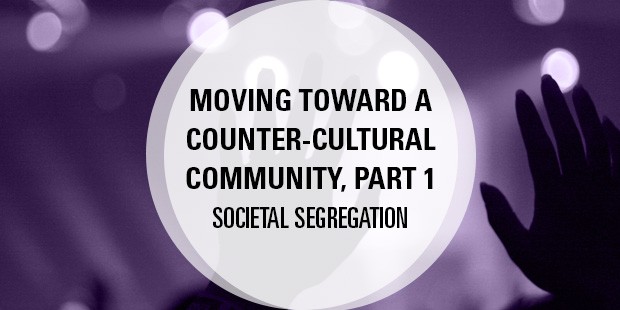
Moving Toward a Counter-Cultural Community, Part 1: Societal Segregation
For the past several weeks, my disciple-making team and I have been working through what a counter-cultural, gospel-centered community of servants looks like. I think this is an important subject matter, one to which I hope to devote several blogposts.
In order for a gospel community to be counter-cultural, we first have to assess what we are encountering in the culture. How does culture and society determine how community is formed and fostered? What are some of the guiding principles and motivations behind its formation? These are questions I find important to determine the starting point, that is, the current reality in which we enter.
I have discovered 11 aspects “societal segregation” that form and foster the community at large. By segregation, I’m talking about ways society separates or isolates individuals to form groups favorable to their preferences and/or convictions. Positively speaking, they may be referred to “affinity” grouping. Most often, this happens naturally. When multiple aspects of societal segregation are combined, clustering sub-cultures are formed. The eleven aspects of societal segregation are:
11 Forms of Societal Segregation
- Demographically – “age and stage” in life; boomers, busters, Xers, Nones, etc.
- Economically – low, middle, upper class
- Ethnically – black, white, hispanic, asian, “other”
- Sexuality – heterosexual, homosexual, bisexual, transgender
- Spiritually – religious, spiritual, atheist, Christian, Catholic, etc.
- Geographically – downtown, midtown, suburb, exurban, rural, etc.
- Linguistically – English, Spanish, Korean, German, etc.
- Educationally – not just levels of education but philosophy as well
- Politically – republican, democrat, independent, tea party
- Occupationally – white collar, blue collar, no collar; government, private sector
- Extra Curricularity – hobbies, sports, music, third-place loyalties
These eleven forms/aspects have several uses in society, most notably being how they serve as filters for societal identification. When you get to know someone, you will discover their age (demographic), perhaps where they live (geographic), what they do for a living (occupation), and maybe even what they enjoy doing in their free time (extra curriculars). These aspects can not only serve as filters but also barriers to keep out (separate) those most unlike yourself. If you find someone to be a Hispanic (ethnic), speaking Spanish (linguistic), practicing Roman Catholic (spirituality), construction worker (blue collar), and you are none of them, it is possible that a person with those aspects may never become a part of your community as barriers have been erected (either knowingly or unknowingly) to prevent that from happening. As you can see, using them as filters can lead to creating barriers, but using them as barriers can lead to judgments and stereotypes. These aspects become the basis or grounds for security the kind of community that most suits your preferences or convictions, that makes you most comfortable by security people most like you. Judgments are made about people to determine who is allowed into the community you (and others like yourself) have formed.
In my next post, I will share what I believe to be the internal driving motivations behind societal segregation and five components of heart idolatry surfacing in the process.












